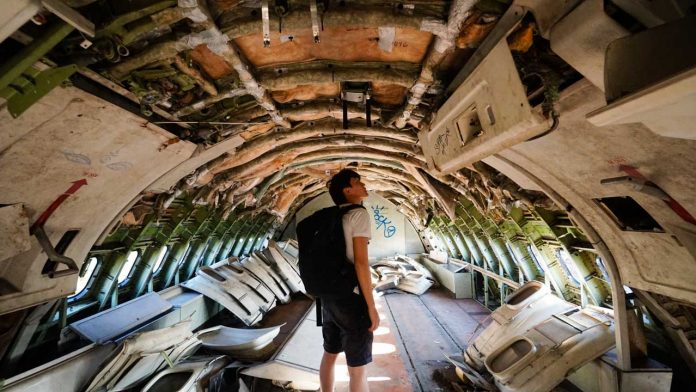
Playtime in a Graveyard
Here where planes expire,
spy a girl play God
not having met him. Fingers
furl like unkindness on whim
till we call to her, begging
to enter. The queen lets us in,
Cheshire grin stolen
mien from her new casualty.
Inside her hollow abode,
mauled walls manifold in cold
eyes, debris from old dreams wrecked.
Child like God, echoes what she has necked.
Plot, Setting, Themes and Literary Devices
This poem uses the airplane graveyard as a vehicle for social commentary on poverty, circumstance and reality. The airplane graveyard has been taken over by a few homeless families who have also taken the liberty of charging an entry fee to visitors.
Upon arriving, we spotted one of them, a young girl who seemed to be manhandling a cat. As she heard us call out to her, she releases the cat and approaches, glassy-eyed, emotionless and demanding money. Cherie and I refused to enter, simply because we weren’t in agreement with 1) what we might have just witnessed- a girl unblinkingly abusing a cat- and 2) getting charged a fee by squatters to enter what was not private property. However, the other half of our group did enter (in the name of research and bringing underrated places to the attention of our readers), and the last stanza of this poem is my artistic interpretation of verbal accounts of the physical landscape within, with pictures of the abandoned fuselage as inspiration/ reference.
Witnessing brutality from the hands of a child hit me hard and spiralled me into a pensive state. I was worried that our awareness and sensitivity to the abuse was simply a product of privileged circumstance, of education, of a claim to morality and a desire to being humane- all of which had not been afforded to the child. In this poem, the idea of God here is interchangeable with the idea of fate and destiny, and an investigation of the perennial question “If God exists then why is there suffering?” The notion of unfairness and unfortunate circumstance of the poor, especially in Thailand where the divide between the rich and poor is incredibly stark, is portrayed in how God must not exist because if God existed, he would not allow for such suffering to befall his people.
Having largely known only misfortune and undesirable circumstance, the child reflects how unkind the world has been to her through her treatment of a weaker, smaller being. While the reader can assume any other creature, the diction choice of “Cheshire grin” subtly suggests the creature to be a cat. In this way, she plays God to the creature by consciously causing it harm. The phrase “Child like God” questions the notion of humans being made in the image of God, but it can also be read as ‘child-like God’ in this base act of unkindness, which subsumes it into an uncivilised, almost primal, almost barbaric act, toeing the thin line and exploring the liminal space between what makes us human and not mere animals.
The “hollow abode” refers to both the discarded fuselage of the planes and is also a transferred epithet for the emptiness the child experiences for never having lived out dreams that she has had as a child due to circumstance. This is further highlighted by how this is reproduced in her “cold eyes” and the internalisation afforded by the word “necked” in the semantic capacity of swallowing. Furthermore, the visual image of a bare neck is reminiscent of how life has been so cut-throat for this child in a Machiavellian fashion.
Being an airplane graveyard, the themes of life and death are inevitable, which introduces irony, first with how the concept of life is associated with a never-living thing (planes) and also with the concept of death in association with a young living child. Additionally, the amount of power this child assumes in land that is not hers seems overwhelming and unjust, yet almost justified for someone whom life has afforded so little. She is referred to as a queen by the omnipresent poetic voice, possibly a reflection of how she views herself and her power in her little kingdom (or queendom).
Poetic Form
This poem takes the poetic structure of a Thai Lilit, which combines both the Raay couplet and Kloang quatrain verse in alternation. Challenges of writing a Lilit in English would be the syllabic restrictions, with 5 syllable couplets and quatrains with three 7 syllable lines and a concluding 9 syllable line. While syllabic restrictions were also encountered when writing the Japanese Chōka, this poem was harder to compose, with interlaced rhymes within and between stanzas, as follows:
x x x x a
a x x x b
b x x x c x d
x x x x d x c
x x x x d x e
x x x x c x x x e
e x x x f
f x x x g
g x x x h x i
x x x x i x h
x x x x i x j
x x x x h x x x j
Perhaps a limitation of writing a lilit in English instead of Thai would be a significant lack in actual rhymes. As such, I also made use of a mixture of visual/ eye rhymes and assonance.
I hope you enjoyed my attempt at exploring Bangkok through the medium of poetry as much as I enjoyed writing it. I’d love to know your interpretations of Playtime in a Graveyard– tell me what crossed your mind in the comments!













